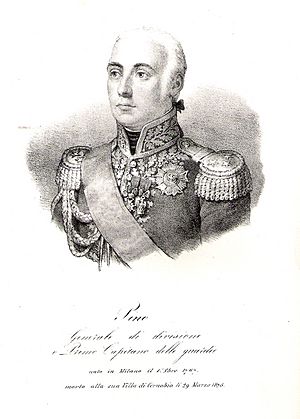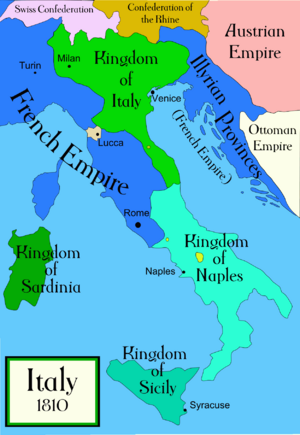Domenico Pino facts for kids
Quick facts for kids
Domenico Pino
|
|
|---|---|
 |
|
| Born | 8 September 1760 Milan |
| Died | 29 March 1826 Cernobbio (aged 66) |
| Allegiance | |
| Rank | |
| Battles/wars | Peninsular War (1808-1810), French invasion of Russia (1812) |
Domenico Pino (born September 8, 1760, in Milan – died March 29, 1826, in Cernobbio) was a brave Italian soldier. He became a high-ranking officer, a General of Division, in the Kingdom of Italy during the time of Napoleon. He also served in Napoleon's famous army, the Grande Armée.
Contents
Domenico Pino's Life and Military Career
Domenico Pino was born in Milan. His family was well-known and respected. He went to school at the Collegio Gallio in Como. After his studies, he joined the army of the Duchy of Parma, where he served as a captain in the cavalry.
Joining Napoleon's Army
In October 1796, Pino joined the Lombard Legion. This was a special army group created by Napoleon for his Army of Italy. Pino started as a grenadier, a type of soldier known for throwing grenades.
He quickly showed his skills and was promoted very fast. Just one month later, he was put in charge of a battalion. By February 1797, he became a colonel. In December 1798, he was promoted to brigadier general. By 1800, he reached the highest rank in the Legion: General of Division. His amazing service helped him rise through the ranks so quickly.
Service in Italy and Beyond
In 1799, Pino was captured at Ancona. He was later released, which meant he missed the important Battle of Marengo in 1800. However, he was still recognized for his leadership. He commanded a division in a campaign in Tuscany during 1800 and 1801. His younger brother, Giacomo Pino, also served with him as his assistant.
In 1802, Napoleon changed the name of the Cisalpine Republic to the Italian Republic. Domenico Pino became its Minister of War in August 1804. When the Republic became the Kingdom of Italy in 1805, Pino continued as Minister of War.
From 1806 to 1815, Pino was appointed commander of Napoleon's Italian Guard. Even though he held this important title, he often served in other places. He commanded Italian soldiers in Prussia in 1807. He also led the 2nd (Italian) Division in Spain from 1808 to 1810. For his excellent service, he was given the title of Count in the Kingdom of Italy in 1809 and in the French Empire in 1810.

The Russian Campaign
In 1812, Pino commanded the 15th (Italian) Division during Napoleon's invasion of Russia. This division was part of the IV Corps, which was mostly made up of Italian soldiers. The IV Corps was led by Eugène de Beauharnais, who was the viceroy (a ruler acting for a king) of Italy.
Pino led his division in the Battle of Maloyaroslavets on October 24, 1812. Sadly, his brother Giacomo was killed in this battle. Even though the French claimed victory, the battle led Napoleon to make a very bad decision. He decided to retreat from Moscow along the same path his army had used to advance. This retreat was disastrous. Out of 27,000 Italian soldiers who went to Russia, only about 1,000 returned.
Later Life and Retirement
In 1813, Pino commanded forces defending Italy. However, he was dismissed by Eugène de Beauharnais. They had disagreed during the Russian campaign. After Napoleon gave up his power in 1814, Eugène wanted to become the king of Italy. But an uprising in Milan on April 20, 1814, stopped his plans. Pino was there during the uprising, but it's not clear if he was directly involved in starting it.
Pino was named a member of the temporary government on April 22. He was also chosen to lead the forces of the Kingdom of Italy. However, northern Italy soon returned to Austrian rule. The Emperor of Austria offered Pino a high military position, but he turned it down.
Pino then retired to Cernobbio, a town near Lake Como. His wife, Vittoria Peluso, was a famous ballerina. She had inherited a beautiful palace called Villa del Garrovo. This villa was later sold to Caroline of Brunswick in 1814, who renamed it the Villa d'Este. Domenico Pino lived in retirement until his death.
See also
 In Spanish: Domenico Pino para niños
In Spanish: Domenico Pino para niños
 | Audre Lorde |
 | John Berry Meachum |
 | Ferdinand Lee Barnett |

